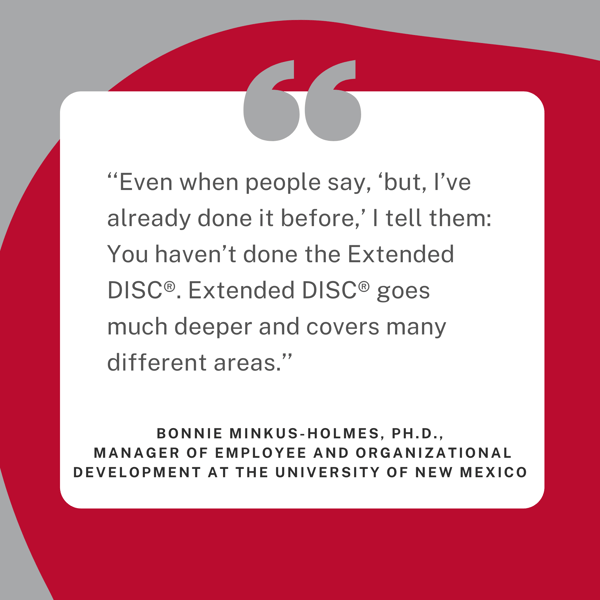A conversation with Bonnie Minkus-Holmes, Ph.D., Manager of Employee and Organizational Development at the University of New Mexico.
Extended DISC: Hi Bonnie, can you tell me about your role at the University of New Mexico (UNM).
Bonnie: I am the manager of Employee and Organizational Development. We have over 5,000 staff. Our office supports faculty and staff for the entire University, as well as 4 branch campuses.
Extended DISC: Tell us why you decided to use Extended DISC?
Bonnie: Honestly, we switched from another DISC tool to Extended DISC out of a financial need. We ended up loving the way Extended DISC is presented and the support materials you provide.
Even when people say, “but, I’ve already done it before,” I tell them: You haven’t done the Extended DISC. Extended DISC goes much deeper and covers many different areas.
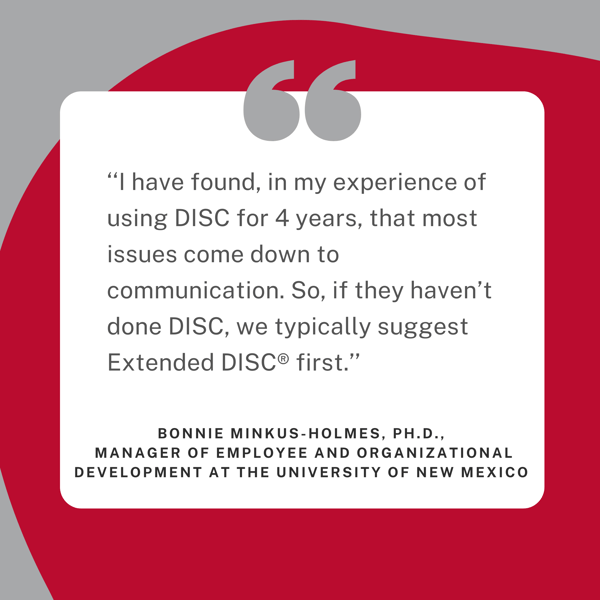 Extended DISC: That's an awesome reply! How are you currently using Extended DISC?
Extended DISC: That's an awesome reply! How are you currently using Extended DISC?
Bonnie: My team is responsible for performance evaluation processes, mandatory training, and HR support for leadership development and coaching. Extended DISC is a part of the many programs my team offers at the University. For example, we offer standardized programs, like ULead; a 6-week management academy that anyone can take. Extended DISC is a foundational part of the program.
We also offer Career Pathway courses which include project management, DEI, and communication. Again, Extended DISC is instrumental in all of these. Each month we also receive 1 to 2 requests, from different groups, for an Extended DISC session.
Extended DISC: Sounds like you have found effective ways to use Extended DISC. Were there any adjustments made to manage and support DISC these past few pandemic years?
Bonnie: Like many of us, the Great Resignation has also impacted our University. Many people have left, and lots of new people have started with us. Several different groups have reached out to my team and said, “Well, we have all this new staff, so we want to do some fun team building!” The first thing they’ll ask for is Extended DISC. They love the results and they love learning about their team. One of the most effective activities we have is they create their own DISC user guide.
Recently, we received a DISC request from our Chancellor of Health Science. He recently hired 5 Strategic Planning Managers and one of them attended our ULead program. She loved DISC so much that she asked for their office to do it. That’s usually how it starts. Someone attends a program where they learn about Extended DISC, and now they want to expand it.
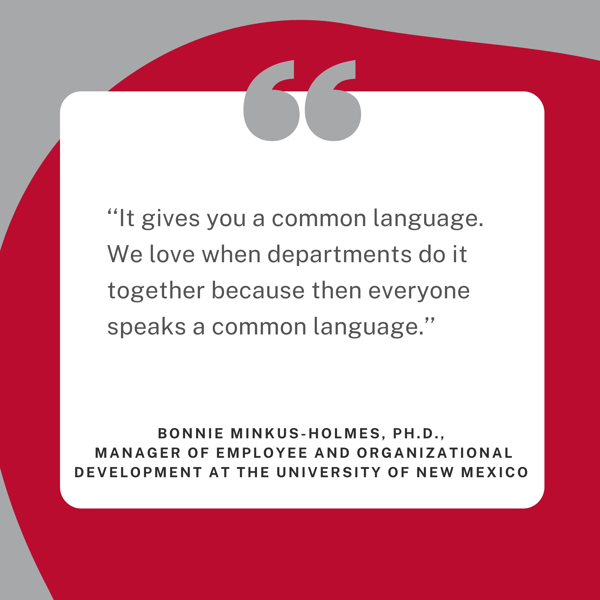 Extended DISC: It sounds like you’re using DISC in many different ways. Share with me the impact you have seen it make.It sounds like you’re using DISC in many different ways. Share with me the impact you have seen it make.
Extended DISC: It sounds like you’re using DISC in many different ways. Share with me the impact you have seen it make.It sounds like you’re using DISC in many different ways. Share with me the impact you have seen it make.
Bonnie: Yes, we use Extended DISC a lot. We receive requests in two different ways. First, a department will fill out an intake form requesting DISC training. The reasons vary. Perhaps they are experiencing communication issues or they have several new staff members on a team. Sometimes, they simply ask us what we would recommend.
Another avenue is being approached directly. HR is a shared service at UNM, so there are HR consultants who work individually with departments. HR consultants may reach out to my team, before a situation gets to progressive discipline or being written up, to say, “OK I have this department and they’re not really communicating in a respectful way” or “there seem to be some issues.” I have found, in my experience of using DISC for 4 years, that most issues come down to communication. So, if they haven’t done DISC, we typically suggest DISC first.
Let me share with you one powerful example of, an “aha” moment from an Extended DISC session. Before the pandemic, there was a team I worked with that consisted of part-time team members, working remotely from all over the United States. The team was experiencing escalating communication issues, with OEO involved. Things were already getting written up and ombuds were involved to do mediation. We came in and facilitated an Extended DISC session with the team.
One person in the session said, “I don’t understand what’s wrong with people. I send my weekly Monday morning email, with my 4 bullet points with what I need and expect, and when I need it. Why do people respond back with 5 to 6 emails and all these questions?” The person couldn’t understand what was “wrong” with people. They never imagined that their communication could be clearer. At the end of the session, this person looks at me and says, “they’re a C and I’m a D! They weren’t trying to annoy me! They just didn’t want to mess up. They wanted to give their best work!” This person had an “aha” moment.
I worked with another department where someone looked at me and said, “I wish I had this ten years ago. This would have solved a lot of problems!” These are just two examples of the impact we see Extended DISC making.
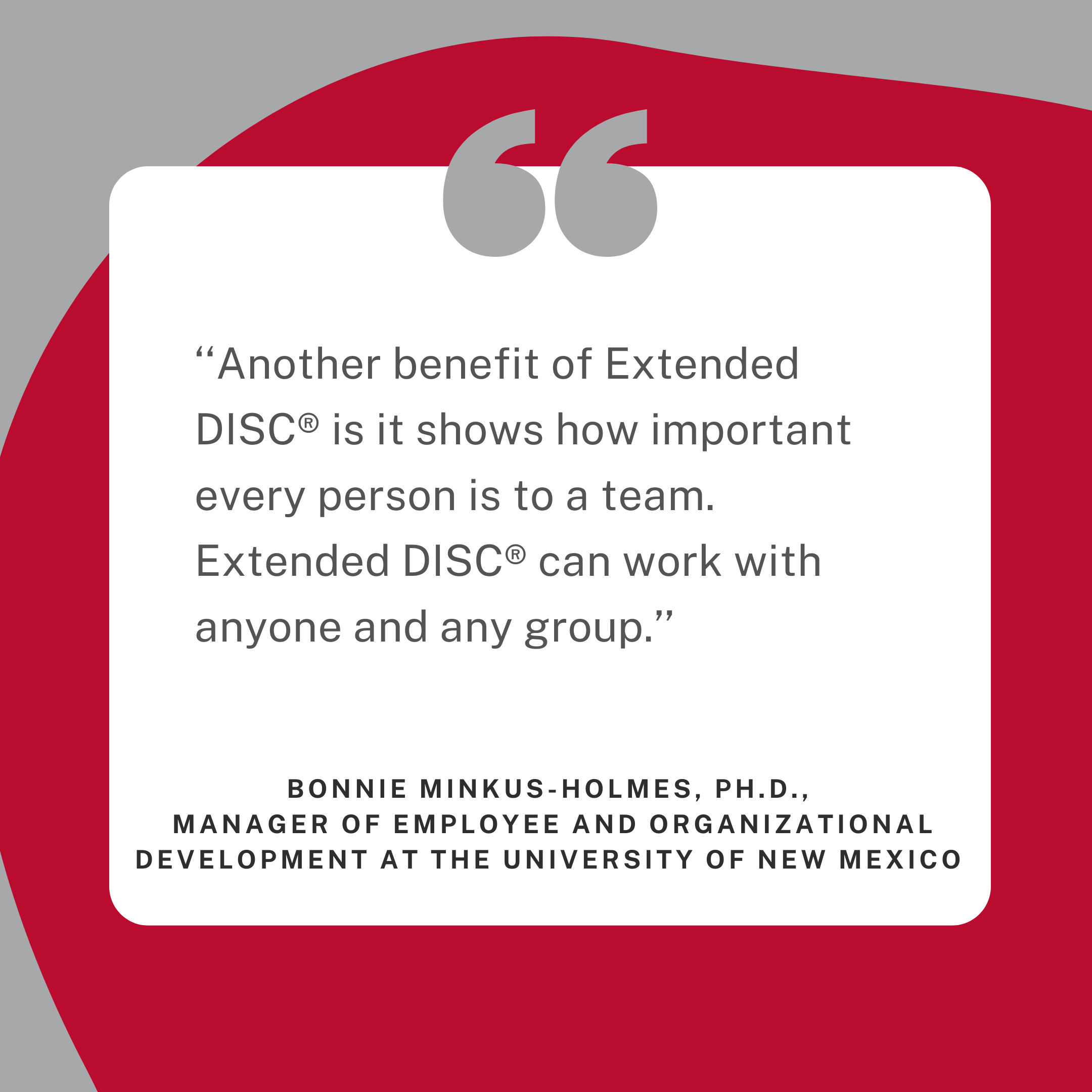
Extended DISC: How many times have we heard that right? At the end of the day, I tell people DISC itself isn’t designed to solve your problems. Rather, it provides you with information and talking points to have meaningful discussions.
Bonnie: Yes! It gives you a common language. We love when departments do it together because then everyone speaks a common language.
Even in my own department, I practice DISC. For example, my co-worker and I were planning an Extended DISC session. I’m someone who likes to have everything done ahead of time so I kept checking with my co-worker to see when her slides would be ready. She approached me to share she prefers to have a lot of time to think and prepare and understood I might work differently. She reminded me she would never give anything less than her best. It reminded me of how I prefer to work and how others prefer to work. DISC provides a common language for understanding behavioral preferences.
Extended DISC: It’s a great reminder that we should be practicing what we teach. I love all these stories and how they’re real-world applications. I’d like to ask you which Extended DISC® assessments do you use? Can you provide some examples?
Bonnie: We normally use the Individual Assessment and we’ve used the Leadership Assessment. We also use the Extended DISC® Team and Team Development Reports.
We are using Extended DISC with our large Health Science Center. We’ve implemented a leadership development program as a pathway for third-year medical residents. We’ve received such positive feedback from the clinicians with whom we do DISC sessions. They love DISC. The residents have gained a lot of value from DISC, in terms of seeing what their preferences are.
For example, in Pediatric and Emergency Medicine there were issues in communicating with the parents of the patients. The doctor is trying to say, “this is what’s best for the child.” The parents either don’t want to listen, or they need more information. The doctor is busy and doesn’t have time to give tons of guidance. Extended DISC opened the discussion about the needs of the families and patients; as to how they would prefer to communicate. Clinicians found Extended DISC to be extremely helpful.
I’m also part of the HSC Campus Mentorship Program and we use Extended DISC with this program as well. The program is open to all staff. We are really thoughtful in our pairing of the mentor and mentee and we’ll look into what their goals are for this six-month program. We always start with Extended DISC.
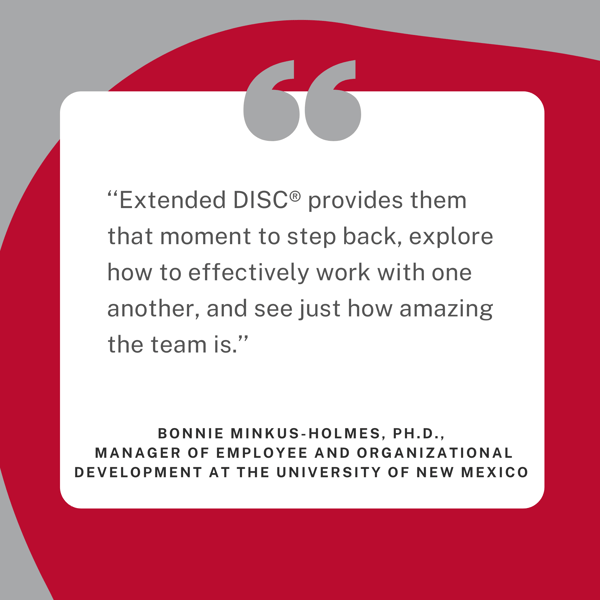 Extended DISC: What advice would you give your peers in an academic setting as to how to get started?
Extended DISC: What advice would you give your peers in an academic setting as to how to get started?
Bonnie: My advice would be to start with the Extended DISC® Individual Assessment; especially if they’re involved in organizational development or HR. So many HR issues are related to communication. I’ve used a lot of assessments and Extended DISC, to me, puts it out there in an easy-to-understand way that doesn’t say there’s something wrong with how a person communicates.
Another benefit of Extended DISC is it shows how important every person is to a team. Extended DISC can work with anyone and any group. For example, one of my consultants is using Extended DISC to open a strategic planning session for the Latin American Institute. Another consultant is using Extended DISC with the School of Economics.
Extended DISC brings everyone together. It’s a common language, but it also shows how everyone contributes to a team. Sometimes teams are so busy they don’t stop to explore why they aren’t getting things done or why they need something. DISC provides them that moment to step back, explore how to effectively work with one another, and see just how amazing the team is.
One reason why I like the Extended DISC is that it’s all about your energy. Extended DISC talks about how you can operate in your style all day and be comfortable, but there are times you need to flex your style to be a great leader or colleague. There are times when your strength doesn’t serve you as well. Extended DISC provides some tips and tools on how to stretch to another style and I think that’s what sets Extended DIS apart.
Extended DISC: What a wonderful way to end today’s discussion! Thank you!

